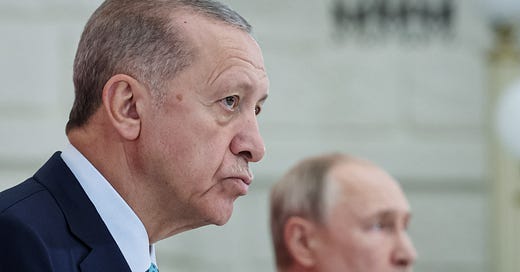Hello! We can’t thank you enough for the support and kind messages we’ve received since announcing our partial paywall.
With your help, we’re on track to keep the recaps coming while funding original, on-the-ground reporting and also paying our office utilities bills, assuming zam zamanı has passed till the next elections.
To be clear: Our contributor reports will remain free to the public and we invite journalists to pitch us story ideas. Last month, we established a non-profit *collective* association to support journalism in Turkey, so do get in touch with project proposals, big and small.
Our recaps – starting with this one – will go behind a partial paywall. To get full access, and other members-only perks, sign up here on Substack or on Patreon, where we offer more options, like a discount membership for readers in Turkey.
Under normal circumstances, meeting a wanted war criminal and getting followed in line by North Korean leader Kim Jong Un would not boost one’s reputation. But the norms changed last decade and Turkish Pres. Recep Tayyip Erdoğan is not anyone.
In his meeting with Russian Pres. Vladimir Putin Monday, Erdoğan lifted his standing on several continents and in multiple spheres of influence – which might explain why he schleped over to Sochi after Putin’s August visit to Turkey did not pan out (read above for arrest warrant).
The pair’s first bilateral in 11 months was presented as negotiation to revive the Ukraine grain deal – which oversaw the export of almost 33 million tons of crops before Moscow pulled out in July.
Underlining the day’s agenda with a bold marker, Russian airstrikes hit a Ukrainian grain exporting port hours before the meeting, which still put forward a potential “mini grain deal.” If approved, Qatari funds will facilitate the shipment of one million tons of grains to Turkey for milling and then distribution to African nations at a discount rate.
Yörük Işık, a geopolitical analyst based in İstanbul, where he runs the Bosphorus Observer, was critical of the proposal, and not just for its relatively limited size.
“It's good for Erdoğan to score something for Africa … but in reality, it's not good for Ukraine,” Işık told Turkey recap. “One million tons will make a small amount of money, but that is money given to Russia, which it will use in its unlawful war in Ukraine.”
Işık also took issue with Erdoğan’s post-meeting statements, in which he called on Kyiv “to soften its approach in order to take joint steps with Russia” in reaching a new agreement.
“Those are Russian foreign ministry lines,” Işık said. “Why did he say those things? It is unknown. It might be … because he obtained something and he's trying to please the other side.”
What the pair discussed in their three-hour meeting also remains unknown. Most commentators guessed negotiations focused on areas of shared influence, such as Libya, Nagorno-Karabakh and/or Syria – the last two of which have appeared less stable than usual in recent weeks.
Other meeting topics touched on advancing Turkey’s regional gas hub ambitions, increasing bilateral trade and teasing Turkey’s second purchase of a Russian-built-and-operated nuclear power plant, this time for Sinop.
The last bit is where Erdoğan shines. He excels in identifying what his counterparts want, and then working every angle to maximize leverage and concessions. It’s the same game for Sweden or the EU.
Specifically in the grain deal scenario, Erdoğan once again stands as a key middleman who’s seen to be fighting global hunger while advancing both Turkish interests and his political legacy.
“You know, in [Monday’s] visit, it’s like he was playing with Russia,” Işık said. "Turkey in that sense is an entrepreneurial nation. They want the trade to continue.”
– Diego Cupolo
Keep reading with a 7-day free trial
Subscribe to Turkey recap to keep reading this post and get 7 days of free access to the full post archives.




